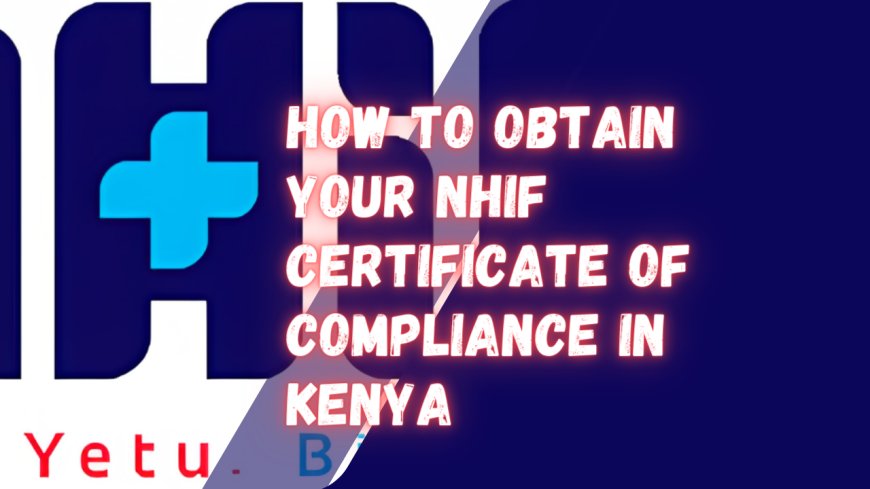How to get your NHIF certificate of compliance In Kenya (2024 Guide)
Learn the simple steps to apply for the NHIF Certificate of Compliance and enhance your business reputation.

The National Health Insurance Fund (NHIF) is a pivotal part of Kenya's health system. As an employer, ensuring your compliance is not just a legal obligation; it's a commitment to your employees' well-being. This comprehensive guide delves deep into how to get your NHIF certificate of compliance effortlessly. By understanding the importance and the process, you'll be well-equipped to support your employees effectively and efficiently.
What is the NHIF Certificate of Compliance?
The NHIF certificate of compliance is a crucial document issued by the National Health Insurance Fund. It validates that a company has adhered to NHIF laws, specifically, the requirement to deduct and remit contributions for all employees to the fund. However, obtaining this certificate is optional; it must be requested by the employer, following specific steps.
Holding a valid NHIF certificate of compliance is beneficial in several ways. Primarily, it signifies that your business operates within legal boundaries, enhancing your reputation. Additionally, it can act as a shield during legal or governmental investigations. Overall, having a certificate streamlines your dealings with NHIF and the government.
How to Apply for the NHIF Certificate of Compliance
Despite the importance of this certificate, obtaining it is a simple process. Here are the steps:
1. Crafting a Request Letter
Your journey begins by penning a formal request letter. This letter should include essential information about your business, such as the name, address, contact number, type of business, and the NHIF unique employer number. Including the total number of employees in your company is also crucial. You can find NHIF compliance certificate request templates online if you need clarification on the letter format.
2. Assembling Supporting Documents
The next step is to assemble and attach supporting documents to your request letter. These may include payroll records, bank statements, and proof of contribution fee payments. These documents allow NHIF to validate your compliance with the law.
3. Updating Your Account
Before applying for the certificate, ensure that your NHIF account is current. Pay any outstanding fines and default contributions to avoid unnecessary delays or rejections in your application.
4. Visiting Your Nearest NHIF Branch
With your application and documents in order, visit the closest NHIF branch. The customer care staff will guide you through the application process, ensuring everything is in order.
5. Awaiting Approval
Patience is critical here, as approval might take a few days. The NHIF staff will give an approximate timeframe for your application's approval.
6. Receiving Your Certificate
Upon approval, you will receive your NHIF certificate of compliance. The NHIF staff will guide you through the collection process.
Applying for NHIF
For individuals, the process of applying for NHIF is a tad different. It can be done online or offline and requires various documents, depending on your employment status and nationality. These may include a copy of your National ID, recent colored passport-size photos, and an employer introduction letter for Kenyans. Additional foreign residents and students requirements include a valid passport and an Alien certificate or work permit.
Losing and Reactivating Your NHIF Card
If you lose your NHIF card, you can get a replacement for Ksh 100. Pay at either National Bank, Equity Bank, Co-op Bank, or KCB, and present the bank slip to any NHIF branch or Huduma Centre for your replacement.
If your card has been deactivated due to non-contribution for twelve months or more, you can reactivate it by paying Ksh 1,500. Your card will be usable again after 60 days.
READ ALSO:NHIF Hospital Selection: A Guide to Choosing and Changing Outpatient Hospitals Online
In Conclusion
The NHIF certificate of compliance is not just a legal requirement for employers in Kenya; it's a demonstration of their commitment to the health and well-being of their employees. By understanding how to obtain it effortlessly, you streamline the process, ensuring your business and employees are adequately covered.
FAQs
1. What is the NHIF Certificate of Compliance? The NHIF Certificate of Compliance is a document that validates that a company has adhered to NHIF laws by deducting and remitting contributions for its employees.
2. What are the benefits of having an NHIF Certificate of Compliance? The certificate enhances a company's reputation and is evidence of legal operation during court cases or government investigations.
3. What documents are needed to apply for the NHIF Certificate of Compliance? Documents needed include a request letter, payroll records, bank statements, and proof of contribution fee payments.
4. How long does receiving the NHIF Certificate of Compliance take? While the timeframe may vary, it generally takes a few days after applying.
5. What should I do if I lose my NHIF Card? You can get a replacement by paying Ksh 100 at either National Bank, Equity Bank, Co-op Bank, or KCB, then present the bank slip to any NHIF branch or Huduma Centre for your replacement.
6. How can I reactivate my NHIF Card? To reactivate a deactivated NHIF card, pay Ksh 1,500, and your card will be usable again after 60 days.
Disclaimer: This article is intended to be a general resource, not professional advice. For specific advice about your circumstances, always seek the help of a professional.












































































